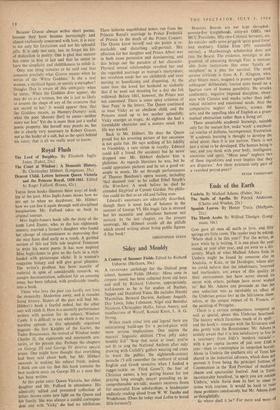Royal Flush
The Lord of Burghley. By Elisabeth Inglis- Jones. (Faber, 21s.) The Court at Windsor : A Domestic History. By Christopher Hibbert. (Longmans, 35s.) Dearest Child. Letters between Queen Victoria and the Princess Royal, 1858-1861. Edited by Roger Fulford. (Evans, 42s.)
THESE three books illustrate three ways of look- ing at the 'past. Miss Inglis-Jones shows how we are apt to when we daydream; Mr. Hibbert how we can live it again through well-disciplined imagination; Mr. Fulford takes us back to original sources.
Miss Inglis-Jones's book tells the story of the tenth Lord Exeter, who, in the late eighteenth century, married a farmer's daughter who found her change of circumstances so depressing that she may have died early as a result. A garbled version of this sad little tale inspired Tennyson to write his worst poem. It has now inspired Miss Inglis4ones to give us the facts in a style loaded with picturesque cliche. It is woman's magazine history and will give great pleasure. The writer's problem has been scarcity of material in spite of considerable research; so, meagre documentation, sufficient for an amusing essay, has been inflated, with predictable results, into a book.
Those who love the past can hardly not love the monarchy. Modernise away, and it remains living history. Haters of the past will find Mr. Hibbert's book a fearful ordeal, but the other sort will relish it. Here is a masterly performance written with passion for its subject, Windsor Castle. It is difficult to say which is the most re- warding episode in this splendidly organised pageant—the first Knights of the Garter, the Tudor Renaissance, the revival of Windsor under Charles II, the eighteenth and nineteenth cen- turies, or the present day. Perhaps the chapters on George III and George IV deserve special praise. One might have thought that everything had been said about both, but Mr. Hibbert succeeds in making his subject fresh; indeed, I think one can say that this book contains the best modern essay on George III as a man that has been written.
At this point enter Queen Victoria, her eldest daughter and Mr. Fulford in attendance. His admirably edited and presented collection of letters throws some new light on the Queen and her family. She was alsVays a candid correspon- dent and with 'Vicky' she had no inhibitions. These hitherto unpublished letters run from the Princess Royal's marriage to Prince Frederick of Prussia to the death of the Prince Consort. The Queen knew herself and she paints a re- markable and disturbing self-portrait. Her affection for her daughter and Prince Albert was in both cases possessive and domineering, and this brings out the paradox of her character. Physical sexual relationships revolted her and she regarded marriage as woman's martyrdom; her revulsion made her see childbirth and even nursing as humiliating and disgusting. At the same time she loved her husband so violently that if he went out shooting for a day she felt widowed. Before 1861, however, the Prince was not canonised. There is some spicy criticism of 'dear Papa' in the letters. The Queen continued to treat Vicky as an obedient child, and the Princess stood up to her mother splendidly. Vicky emerges as tragic. At eighteen she had a formidable character and a mature mind. Her life was wasted.
Back to Mr. Hibbert. He does the Queen proud but his arresting picture of her successor is not quite fair. He says nothing of his fidelity to friendship, a rare virtue in royalty. Edward could kill a friend (by accident) but he never dropped one. Mr. Hibbert declares him a philistine. As regards literature he was, but he could appreciate pictures and he set a good ex- ample in music. He sat through performances of Thomas Beecham's opera season, including 'that damned row' as he called Ethel Smyth's The Wreckers. A week before he died he attended Siegfried at Covent Garden. No philis- tine could do that as an old and failing man.
Edward's successors are admirably described, though there is some lack of balance in the account of George VI. His tragic fate is stressed but his eccentric and infectious humour not noticed. In the last chapter, on the present sovereign, Mr. Hibbert avoids all the pitfalls which attend writing about living public figures. A fine book!
CHRISTOPHER SYKES,






























 Previous page
Previous page